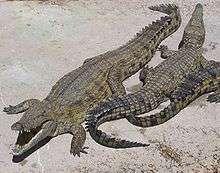Definify.com
Webster 1913 Edition
Crocodile
Croc′o-dile
(krŏk′ō̍-dīl; 277)
, Noun.
1.
(Zool.)
A large reptile of the genus
Crocodilus
, of several species. They grow to the length of sixteen or eighteen feet, and inhabit the large rivers of Africa, Asia, and America. The eggs, laid in the sand, are hatched by the sun’s heat. The best known species is that of the Nile (Crocodilus vulgaris
, or Crocodilus Niloticus
). The Florida crocodile (Crocodilus Americanus
) is much less common than the alligator and has longer jaws. The name is also sometimes applied to the species of other related genera, as the gavial and the alligator. 2.
(Logic)
A fallacious dilemma, mythically supposed to have been first used by a crocodile.
Crocodile bird
(Zool.)
, an African plover (
– Pluvianus ægypticus
) which alights upon the crocodile and devours its insect parasites, even entering its open mouth (according to reliable writers) in pursuit of files, etc.; – called also Nile bird
. It is the trochilos
of ancient writers. Crocodile tears
, false or affected tears; hypocritical sorrow; – derived from the fiction of old travelers, that crocodiles shed tears over their prey.
Webster 1828 Edition
Crocodile
CROCODILE
,Noun.
1.
An amphibious animal of the genus Lacerta or lizard, of the largest kind. It has a naked body, with four feet and a tail; it has five toes on the fore feet, and four on the hind feet. It grows to the length of sixteen or eighteen feet, runs swiftly on land, but does not easily turn itself. It inhabits the large rivers in Africa and Asia, and lays its eggs, resembling those of a goose, in the sand, to be hatched by the heat of the sun. [See Alligator.]2.
In rhetoric, a captious and sophistical argument contrived to draw one into a snare.CROCODILE
,Adj.
Definition 2026
crocodile
crocodile
English

Nile crocodiles
Noun
crocodile (plural crocodiles)
- Any of the predatory amphibious reptiles of the family Crocodylidae; (loosely) a crocodilian, any species of the order Crocodilia, which also includes the alligators, caimans and gavials.
- 2005, Mwelwa Musambachime, Basic Facts on Zambia, page 97,
- Industrial and rural expansion is shrinking and destroying the Nile crocodile's natural habitat. The Nile crocodiles, in particular, have been a source of highly durable leather for a variety of products which can be crafted and manufactured.
- 2008, Walkter B. Wood, Chapter 16: Forensic Identification in Fatal Crocodile Attacks, Marc Oxenham (editor), Forensic Approaches to Death, Disaster and Abuse, page 244,
- Two species of crocodile inhabit Australian waterways: (a) the saltwater Crocodile — Crocodylus porosus, and (b) the freshwater crocodile — Crocodylus johnstoni.
- 2011, Sam Thaker, The Crocodile's Teeth, page 31,
- One contained some brightly-coloured tropical birds, one a python and the other a large and very lively crocodile.
- I told the customer that the boxes containing the crocodile and the python were not packed to my satisfaction, as there were not enough nails securing them.
- 2005, Mwelwa Musambachime, Basic Facts on Zambia, page 97,
- A long line or procession of people (especially children) walking together.
- 1939, George Orwell, Coming Up for Air, part 2, chapter 8
- Sometimes the kids from the slap-up boys' schools in Eastbourne used to be led round in crocodiles to hand out fags and peppermint creams to the 'wounded Tommies', as they called us.
- 1939, George Orwell, Coming Up for Air, part 2, chapter 8
- (logic) A fallacious dilemma, mythically supposed to have been first used by a crocodile.
- Maria Edgeworth
- We have seen syllogisms, crocodiles, enthymemas, sorites, &c. explained and tried upon a boy of nine or ten years old in playful conversation […]
- Maria Edgeworth
Synonyms
- (predatory amphibious reptile): croc (informal)
Derived terms
terms derived from the noun crocodile
Related terms
Translations
reptile
|
|
logic: fallacious dilemma
See also
Verb
crocodile (third-person singular simple present crocodiles, present participle crocodiling, simple past and past participle crocodiled)
- (intransitive) To speak one's native language at an Esperanto-language gathering, rather than Esperanto.
Translations
French
Etymology
From Old French cocodril, from Medieval Latin cocodrillus, from Classical Latin crocodilus, from Ancient Greek κροκόδειλος (krokódeilos). The word was later refashioned after the Latin and Greek forms.
Pronunciation
- IPA(key): /kʁɔkɔdil/
Noun
crocodile m (plural crocodiles)
Norman
Etymology
From Old French cocodril, from Medieval Latin cocodrillus, from Classical Latin crocodilus, from Ancient Greek κροκόδειλος (krokódeilos).
Noun
crocodile f (plural crocodiles)